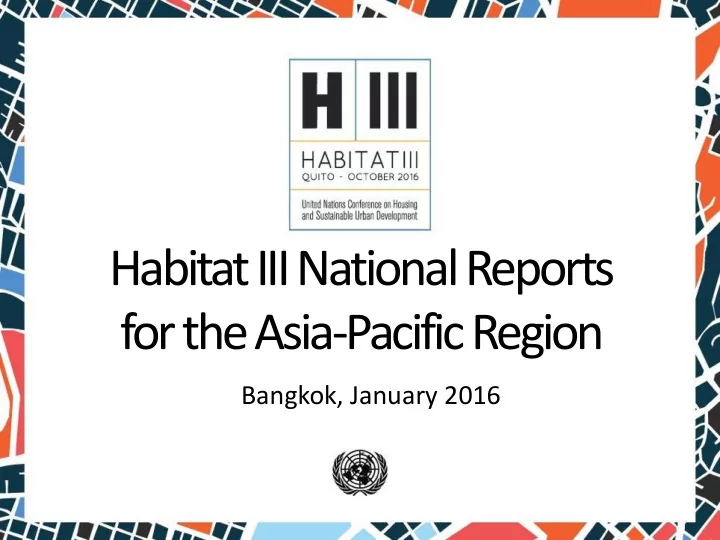

Habitat III National Reports for the Asia-Pacific Region Bangkok, January 2016
National Reports Overview • All member states were requested to complete and submit National Reports to the Habitat III Secretariat. • To date, in the Asia-Pacific Region, 9 National Reports have been received (5 are drafts). • Although the deadline for National Reports was June 2014, the goal is still to collect as many National Reports as possible prior to the Habitat III Conference • The National Reports received to date were considered during the development of the Regional Report and examples from National Reports have been incorporated into the Regional Report as appropriate • The National Reports are an important input to the Regional Report, but that is not their only purpose. They also serve as a way of assessing what has happened since Habitat II and they serve as National-level preparations for the Habitat III Conference
National Reports Format • I. Urban Demographic Issues and Challenges for a New Urban Agenda • II. Land and Urban Planning: Issues and Challenges for a New Urban Agenda • III. Environment and Urbanization: Issues and Challenges for a New Urban Agenda • IV. Urban Governance and Legislation: Issues and Challenges for a New Urban Agenda • V. Urban Economy: Issues and Challenges for a New Urban Agenda • VI. Housing and Basic Services: Issues and Challenges for a New Urban Agenda • VII. Indicators (1976, 1996, 2016) • VIII. Case Studies and Policy Documents
Final National Reports • The following countries in the Asia-Pacific region have officially submitted final reports to the Habitat III Secretariat Finalized Reports Received Japan Korea Pakistan Turkey
Draft National Reports • The following countries in the Asia-Pacific region have unofficially submitted draft reports Draft Reports Received Afghanistan Cambodia China Pacific Region Indonesia
In Progress National Reports • The following countries in the Asia-Pacific region have communicated with the Habitat III Secretariat about their National Report preparations and are known to be working on their National Report. However, no documents have been received at this time. National Reports In Progress Bangladesh India Myanmar Philippines Russia Singapore Thailand Vietnam
Summaries of Inputs towards the New Urban Agenda: Japan • Strive to expand the healthy life span of elderly people • Improve the conditions for both men and women to share the experience of working and raising children to increase female participation in society • Promote locating workplaces and houses closely, resolve traffic congestion, reduce disaster risks, improve urban environments • Apply Japan’s experience to help countries in Asia solve urbanization challenges • Evaluate and share disaster risks, develop intensive policy programs for disaster prevention and reduction • Develop sensors, robots, and other technologies applicable to medical, nursing, and life care • Publicly open national and local government data • Create incentives for women to enter the agricultural, forestry, and fishery industries • Make housing and buildings more energy efficient
Summaries of Inputs towards the New Urban Agenda: Korea • Carry out urban regeneration policies that focus on revitalizing existing downtown areas, improving the quality of housing and enhancing the quality and vitality of underdeveloped rural human settlements • Expand job opportunities for the aged • Design policies that welcome women into urban spaces, include more women in urban planning, reduce discrimination and reflect women’s views in the planning, development, and operation of human settlements • Develop plans and techniques for adaptation to climate change • Enhance the convenience, comfort, and stability of using eco-friendly transportation • Increase transparency in the following areas: local finance, bidding and contracting, financial statistics of stakeholders including local government, local education, and local public organizations
Summaries of Inputs towards the New Urban Agenda: Pakistan • Implement Pakistan Vision 2025, which envisages a people-centered and inclusive approach to development whereby, the main driver of growth will be anchored in better functioning urban clusters, focus on the creation of jobs, bolstered by better skilled and more employable youth, led by the private sector and based on productivity improvement and export enhancement. • Develop Medium and secondary towns with the aim of inclusive and holistic urban development. • Streamline the planning application process to reinforce transparency • Develop practical operational programs for women to play an active role in the development of towns and cities for greater social and economic benefits. • Digitize land records, spatial plans and revenue maps to improve land management. • Empower local governments by ensuring that newly elected local councils have sufficient resources and authority to address the development challenges • Strengthen laws to provide basic housing facilities, discourage the withholding of developed vacant land and speculation on land prices using mechanisms such as a land bank. • Develop new modes of housing finance such as utilization of pension, benevolent and insurance fund to increase the flow of funds into housing sector.
Summaries of Inputs towards the New Urban Agenda: Turkey • Prioritize compact urban form through coordination of central and local administrations, solving how mixed-use zones shall be located in the city, creating proper and livable housing sites, taking measures to ensure that city dwellers make equal and fair use of urban services • Strengthen urban planning and implementation through participatory decision-making processes • Enhance technical, administrative and financial capacities of the local administrations, broaden their basis for financial income, and produce optimal spatial plans through participation of local actors and decision- making mechanisms • Enhance urban life quality by underlining the right to adequate housing for city dwellers, encouraging urban agriculture and enhance planning efficacy • Focus on climate change policy as the largest challenge with ensuing disasters, migration movements and dents to economic development
To View National Reports: habitat3.org To Submit a National Report: habitat3secretariat@un.org For questions on National Reports in the Asia Pacific Region: Marina Brenden Habitat III National Reports Consultant (Asia and the Pacific) marinabrenden.habitat3@gmail.com
Recommend
More recommend